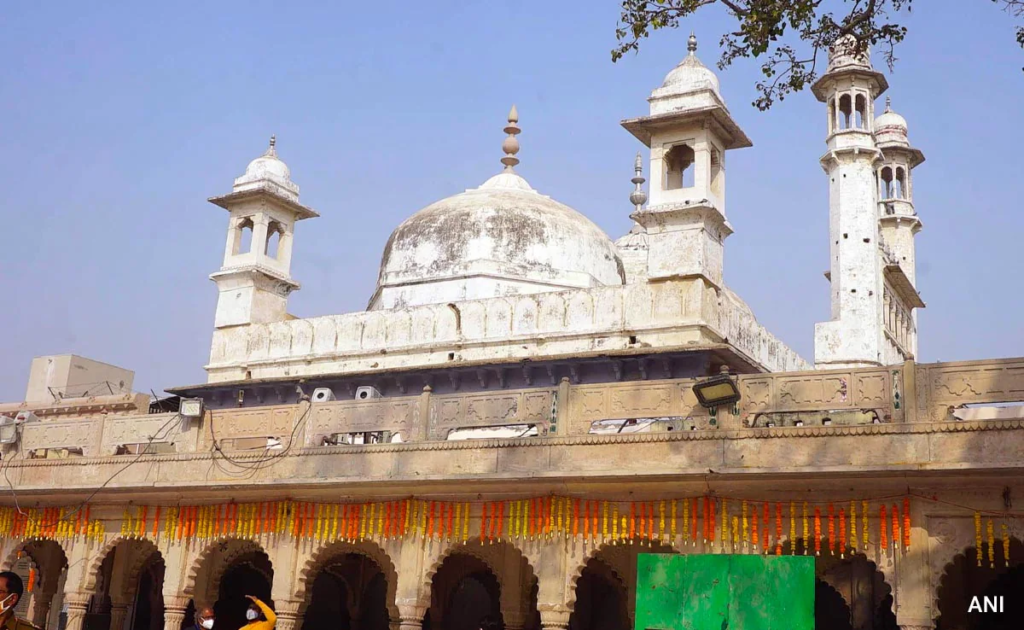Landmark Ruling Grants Hindus Access to Gyanvapi Mosque’s Sealed Basement
Landmark Ruling-Introduction:
Landmark Ruling-In a significant and historic decision, a city court in Varanasi ruled on Wednesday that Hindu petitioners would be permitted to worship inside the sealed basement, known as ‘Vyas ka tekhana,’ of the Gyanvapi mosque complex. The verdict emphasized that arrangements for this worship, including the removal of barricades, must be completed within a week. Furthermore, the court specified that the prayers should be conducted by priests affiliated with the Kashi Vishwanath Temple.

Landmark Ruling-Legal Development:
Landmark Ruling-The lawyer representing the four Hindu women petitioners, Vishnu Shankar Jain, announced the court’s decision, highlighting that the Hindu community has been granted the right to offer prayers in the designated area. Jain asserted that the district administration is obligated to make the necessary arrangements within the stipulated seven days. The court’s ruling appears to mark a momentous step towards acknowledging the rights of the Hindu community in Varanasi.
Landmark Ruling-The mosque committee, however, is anticipated to challenge the court’s order by appealing to a higher court. This legal battle underscores the complex nature of religious and cultural disputes in India, especially in a city as historically and spiritually significant as Varanasi.
Landmark Ruling-Background of the Dispute:
Landmark Ruling-The Gyanvapi mosque complex has been a focal point of contention between Hindus and Muslims for years. The mosque features four ‘tekhana’ or cellars in the basement, with one still under the possession of a family of priests who used to reside there. These priests, claiming hereditary rights, argued for access to the structure to perform religious ceremonies.
Landmark Ruling-According to the petition, Somnath Vyas, a priest associated with the temple, conducted prayers in the basement until 1993 when it was sealed off. The closure was reportedly linked to the discovery of debris from statues of Hindu gods during a survey of the area. Additionally, claims were made that parts of a pre-existing structure, recognized as a temple by the Archaeological Survey of India (ASI) report, were used in the construction of the mosque.
Landmark Ruling-Legal Implications and Controversies:
The court’s recent decision comes in the wake of a broader legal battle over the religious and historical significance of the Gyanvapi mosque complex. The order to allow Hindu worship in the sealed basement raises questions about the delicate balance between preserving religious freedom and respecting the sanctity of historical structures.
The mosque committee’s expected challenge to the court’s ruling suggests that the dispute is far from resolution. Such legal battles often involve nuanced arguments regarding historical evidence, religious practices, and the interpretation of archaeological findings. The Gyanvapi mosque complex, with its layered history, becomes a microcosm of the larger debate surrounding the coexistence of different religious communities in India.
The Role of Archaeological Findings:
The assertion that debris from Hindu statues was found in the area and that a pre-existing temple structure existed adds a layer of complexity to the dispute. The ASI report, recognizing the site as a temple, further fuels the controversy. The use of pillars from the pre-existing structure in building the mosque becomes a point of contention, raising questions about the mosque’s legitimacy and the historical authenticity of its construction.
The Supreme Court Appeal for Excavation and Survey:
A day after the city court’s ruling, the four Hindu women petitioners approached the Supreme Court, seeking an excavation and scientific survey of a ‘shivling’ reportedly discovered inside the sealed ‘wazukhana’ area of the mosque complex. This appeal introduces another dimension to the dispute, emphasizing the need for a comprehensive examination of the site to uncover any hidden relics or structures that could influence the narrative surrounding the mosque’s history.
Cultural and Religious Sensitivities:
The dispute over the Gyanvapi mosque complex is deeply entwined with cultural and religious sensitivities, not just in Varanasi but throughout India. Varanasi, one of the oldest continuously inhabited cities in the world, holds immense religious significance for both Hindus and Muslims. As a result, any legal decision regarding places of worship in the city reverberates beyond the immediate parties involved, affecting the larger fabric of interfaith relations in the country.
The Need for Dialogue and Resolution:
Given the complexity and sensitivity of the Gyanvapi mosque dispute, there is an urgent need for dialogue and mediation between the concerned parties. The legal battles, while necessary for addressing specific grievances, may not be sufficient to foster lasting harmony and understanding. A multi-faceted approach that includes historical research, archaeological assessments, and respectful interfaith dialogue could pave the way for a more comprehensive and enduring resolution.
Conclusion:
The court’s decision to allow Hindus to worship in the sealed basement of the Gyanvapi mosque complex is a pivotal development in an ongoing legal saga that intertwines religious sentiments, historical claims, and archaeological findings. As the dispute continues to unfold, it highlights the challenges inherent in addressing complex issues related to religious coexistence and historical preservation. The upcoming Supreme Court appeal and potential further legal proceedings will likely shape the trajectory of this dispute, with broader implications for similar conflicts across the diverse landscape of India’s cultural and religious heritage.

[…] for Lifei Huang, a 22-year-old California woman who ventured out onto Mount Baldy on Sunday. As an atmospheric river pounded California with relentless rain and snow, Huang vanished without a trace. Despite […]
I’d add some other nuances that add weight to your writing. Can I?